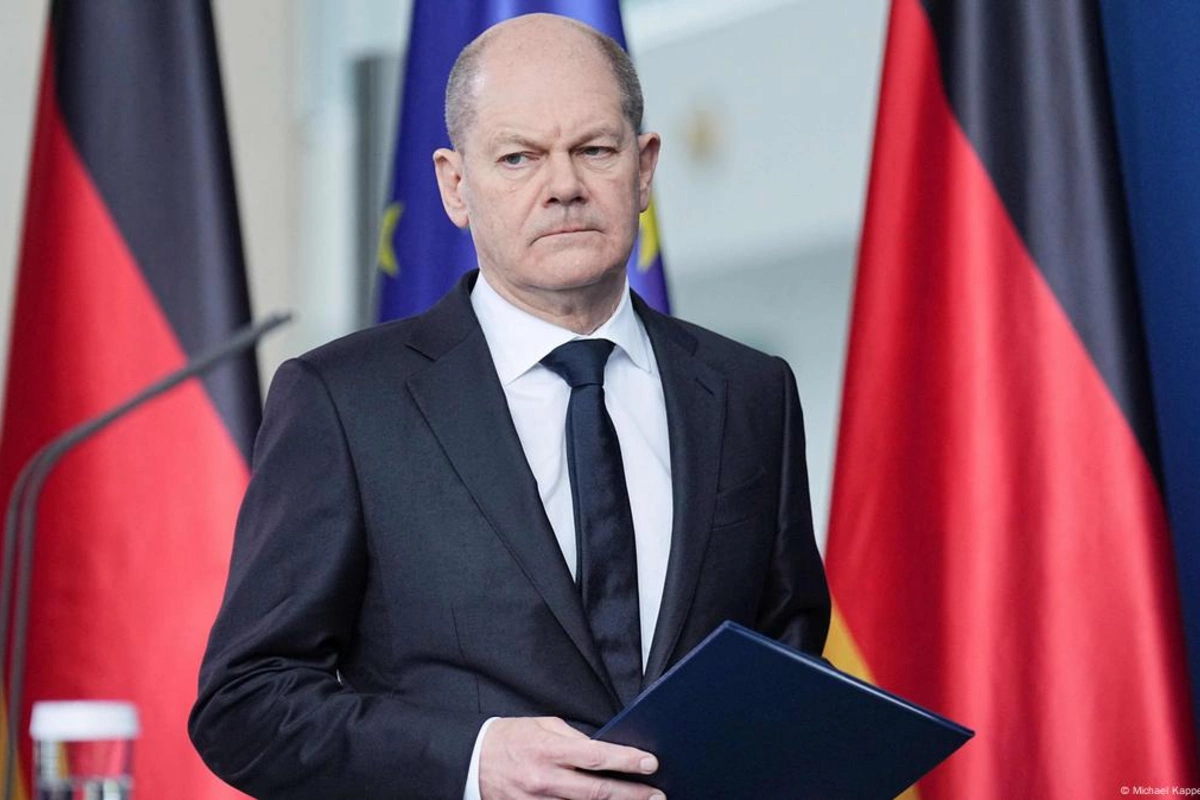
German Chancellor Olaf Scholz informed Azerbaijani President Ilham Aliyev in a phone call that he would be unable to attend COP29 in Baku due to a political crisis unfolding in Germany.
Photo: Michael Kappeler/AFP/Getty Images
German Chancellor Olaf Scholz informed Azerbaijani President Ilham Aliyev in a phone conversation that he would not be able to attend COP29 in Baku due to a political crisis erupting in Germany. This announcement has sparked a wave of discussions and questions about the nature of the crisis, its underlying causes, and Germany’s ability, as the world’s fourth-largest economy, to handle these challenges.
The instability facing Germany, though affecting various sectors, is not insurmountable. The country possesses significant economic and political potential that could help it overcome the difficulties at hand. However, the crisis is serious and multifaceted, impacting several areas simultaneously—from politics and economics to finance. The primary reasons for the current instability lie within Germany's domestic politics, where a lack of cohesion within the ruling coalition has surfaced.
Germany’s current government is a complex coalition of three parties, each pursuing its own interests. In practice, this has led to considerable disagreements on key issues, complicating decision-making and reducing the government’s effectiveness. As a result, important social and economic projects are either delayed or passed with compromises that fail to satisfy all parties. Key disagreements within the coalition include energy policy, budget planning, and social reforms. These factors are especially significant in a time when the country faces rising inflation and economic challenges.
With parliamentary elections approaching, political tensions in the country are increasing. Many analysts believe that the Christian Democratic Union (CDU), which led Germany for many years and has considerable experience in economic governance, may win the upcoming elections. A CDU return to power could boost economic growth and sustainable development in Germany. Unlike the Social Democrats, who prioritize social initiatives such as support for the underprivileged, refugee assistance, and social programs, the CDU traditionally emphasizes economic stability and growth. The CDU’s return could revitalize Germany's economic policy, with a focus on reforms and long-term financial planning.
However, the current political crisis is linked not only to domestic issues but also to external challenges. One significant external factor affecting Germany is the political situation in the United States. Germany, like other EU countries, closely monitors developments in America. If Donald Trump returns to power, it could increase pressure on Europe, especially economically and militarily. Under Trump’s previous administration, transatlantic relations faced difficulties, and his potential return is a cause for concern among European leaders as it could impact key areas such as trade, security, and climate policy.
Another external factor contributing to the tension is the conflict in Ukraine, which has had extensive economic and political repercussions across Europe. Germany, one of Russia's largest economic partners before the conflict, has had to reassess its energy and economic strategies under sanction pressures. This situation has led to an increased dependence on alternative energy sources and rising costs for energy imports, which, in turn, place pressure on Germany’s economy. Additionally, the prolonged Ukraine-Russia conflict continues to generate instability in the region, influencing domestic political processes in Germany. Internal crises, such as migration and Islamism, represent two serious factors threatening peaceful life in Germany.
The Middle East, where tensions surrounding Palestine have escalated, also significantly affects Germany. The conflict in this region impacts German political decisions due to the country’s close economic and diplomatic ties with various Middle Eastern nations. Moreover, deteriorating relations with China, which has recently adopted a tougher stance on several issues, add further challenges for Germany. As a major trading partner, China is crucial for Germany, and any changes in relations could affect German exports and investments in China. All these external factors heighten the pressure on Germany's domestic politics, complicating the decision-making process.
In this complex scenario, Germany faces a challenging task: not only to overcome its internal crisis but also to adapt to global challenges. In a world where politics and economics are becoming increasingly unstable, Germany must strike a balance between the interests of coalition parties and foreign policy. It is essential to understand that resolving the crisis will require time, effort, and cooperation at the federal government level, as well as collaboration with international partners.
Germany has all the resources needed to overcome the current crisis, though the process will not be easy. Domestic reforms, coupled with building sustainable relationships with key partners, could help Germany maintain its position as a leading power within the European Union and continue to play a vital role on the global stage.
Share on social media